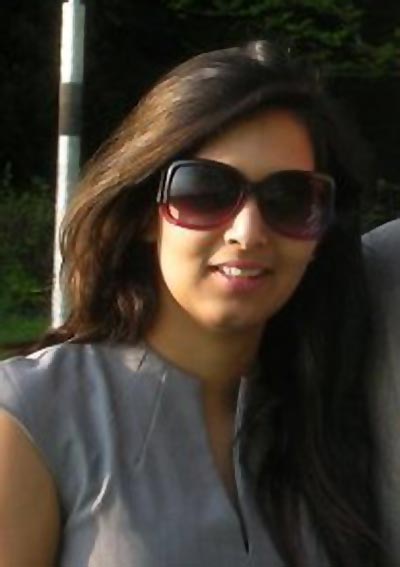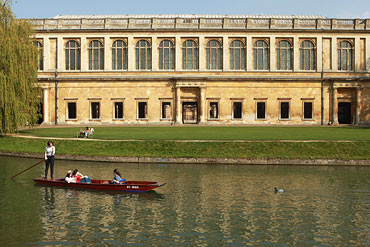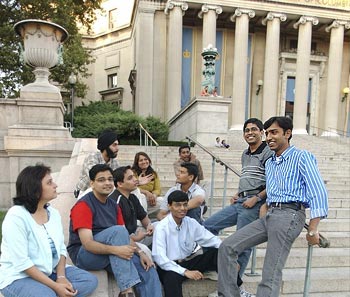 | « Back to article | Print this article |
Meet the Indian-born Cambridge topper!
Mahima Khanna from Kolkata recently became the third Indian to win accolades at Cambridge, bagging the prestigious Stevenson Prize.
Twenty three-year-old Mahima Khanna has became the third Indian to receive the Stevenson Prize at Cambridge University, following in illustrious footsteps -- Professor Amaratya Sen was the first Indian to win the award in 1956 and Sir Partha Dasgupta won it in 1967 (interestingly, both were Kolkata natives, as is Mahima). The Stevenson Prize is awarded to students of the university who perform exceptionally well in academics.
Khanna was a student of MPhil in Economic Research and sought her specialisation in International Trade and Advanced Econometrics at the university, where she topped a class of 120.
She currently works as a consultant with Mzaya Private Limited, a Mumbai-based start-up that is into helping young entrepreneurs develop business opportunities in India and has also served as an intern with the Planning Commission.
Mahima completed her ISC from La Martiniere College for Girls, Kolkata and holds a Bachelor of Science degree in Economics from St Xavier's College in Kolkata.
Her mother Gauri Kumra, who works as a gynaecologist at the Bhagirathi Neotia Woman & Child Care Centre in Kolkata, describes her as a 'quiet girl' who has made her proud.
"Mahima has always been a quiet young girl. I have raised her as a single parent. Together, we have faced a lot of challenges, but she has sailed through them with such grit, which makes me feel proud of my daughter," she says.
"All those years of hardship have finally paid off with this honour. She's suffered a lot, but she is a sweet child. She has never complained to anyone about her problems. I can only be happy for her at this moment," Kumra told us.
In the following pages, Mahima Khanna talks about success, what the Stevenson Award means to her and the Cambridge experience. Read on.
'I don't think I am an ideal example of a topper'
When you learnt about the Stevenson Prize, did you think you would be one of the few Indians to win it?
Yes I did. When I was first informed about it a week ago, I didn't believe it. Although I know I worked hard for this, it is humbling to know that I share the space with people like Prof. Amartya Sen and Sir Partha Dasgupta and several other eminent personalities in my field.
Did you always want to study Economics?
My mother is a gynaecologist and she always wanted me to be a doctor like her. Although I wasn't so keen to pursue a medical career, I appeared for the Joint Entrance Exam (JEE) much against my will, to fulfill my mother's dream. But when the results were out, my mother was travelling so I could not talk to her.
Instead, I spoke to my (maternal) grandfather, who asked for my scores and asked me if I wanted to pursue medicine. I told him I was not interested and that's when he asked me to talk to my mother about it. He first supported my decision to study Economics and today I feel very grateful to him.
Why did you choose Cambridge?
I was 13 when the thought of Cambridge first struck me. I would always say to myself, 'I want to study there one day'. When I was 19, I ensured that I had the right grades to back my dream.
How did you prepare yourself for Cambridge?
While I was pursuing graduation at St Xavier's College, in a class of 60, 50 students were preparing for the CAT exam. There was nothing else on their minds (most of them have also made it to the top IIMs). But I had a different dream going for me. I had to stay focused.
It was easy to be sidetracked during such moments, but I chose to follow my dream. I was among the very few in my batch who gave the GRE where I scored full marks in Mathematics (800).
However, I don't think I am an ideal example of a topper. I opened my book to study only four days before the exam!
But I think when you write your SOP (Statement of Purpose), it will all dawn upon you.
Your thoughts will reflect in your writing. That's a small example of life. You will have to ask yourself what you really want -- the purpose. Once you seek that, the road ahead will seem a lot easier for you.
'Cambridge is about all round development'
Cambridge has been a great learning experience. Two years there have definitely taught me a lot about life and helped me grow as an individual. The professors are extremely talented, resourceful and outstanding, to say the least.
Students get to involve themselves in numerous projects and research activities under the guidance of expert professors and scholars. There's immense scope to learn and develop your knowledge while you are studying your course.
Cambridge is about all round development. I am fortunate to have studied at Cambridge, for the experience has definitely helped me understand my abilities better. It has made me a better individual, which is exactly why I chose to come back and do my bit for the country.
I want to put all my learnings at Cambridge to good use. I am rather happy working here in my country.
Your mother mentioned that the two of you have faced a lot of challenges while you were growing up. Could you tell us your greatest learnings during those years?
Yes, there were challenges. But according to me, life's challenges are about the way you perceive them. If you want to see them as challenges and difficulties, you will continue to see them that way. You will not be able to see and move beyond them.
But if you choose to look at the brighter side of things -- the advantages and privileges you have over the lesser fortunate ones, you will probably learn to appreciate and live life better. At least that's what I did.
Who/what would you attribute your success to?
I would not be the right example of success as my journey has just begun. And this is a small step in that direction. But if you were to ask me, I would say that life is all about how you see it.
Sometimes you are just lucky with your decisions. But at the same time, one must not lose out on life in the quest to succeed and excel.
For example, I have a good academic record, but I have never missed out on extra-curricular activities. I did not take any extra coaching to improve my grades.
'Two years living abroad have taught me to be independent and self-reliant'
It wasn't easy, but the fact that I had relatives and cousins in the UK helped me a lot. But otherwise, when you move to a new country, a new place, you feel disconnected from your comfortable world of luxuries.
When you are home, you have parents to take care of your needs and attend to them. When you are staying alone, you have to manage your daily stuff, cook your own food, manage your expenses. I went on a partly funded scholarship (the scholarship covered my tuition fees) but I had other expenses to meet. So, I took up a job as a librarian and became a research assistant.
Two years living abroad have taught me to be independent and self-reliant.
Where do you see yourself going professionally?
My dream is to work for the World Bank in India. I want to bring about a revolution here in my country. That's why I chose to return from England. I want to work towards facilitating reforms in the business and trade sector in India.
Besides Economics, what are your other interests?
I love to play golf, and I love to cook. I am an experimental cook. Another interesting fact about me is that whenever I am angry I cook. Besides, I love to try out different cuisines, especially Indian, Mexican and Italian. One of the most experimental and popular dishes I have cooked is 'sambhar pasta'!
I am not a passionate reader, but I love to write and I have also been the editor of my college magazine.
'Wherever you are, you must learn to enjoy the moment'
What tips would you like to offer young Indians who want to study abroad?
If you want to study in the UK, you cannot afford to bunk lectures.
You need to attend all the classes and take down notes. The knowledge you get from classrooms does not equal what you can learn from books and the Internet. So, while you are there, do not miss out on the opportunity to learn.
Also, be open to change. You will meet people from different countries when you are living abroad. You must interact with them. Not many of us get the privilege of global exposure at a young age. If you are getting it, make sure that you take full advantage of it.
Also, talking to people helps you know a lot of things about various countries and their living culture. It's a different learning experience.
Most importantly, wherever you are, you must learn to enjoy the moment.
Participate in as many activities you can. Your school days will never come back. Once you start earning, you may not have so much time for yourself. So remember to make optimum use of your college years effectively.




